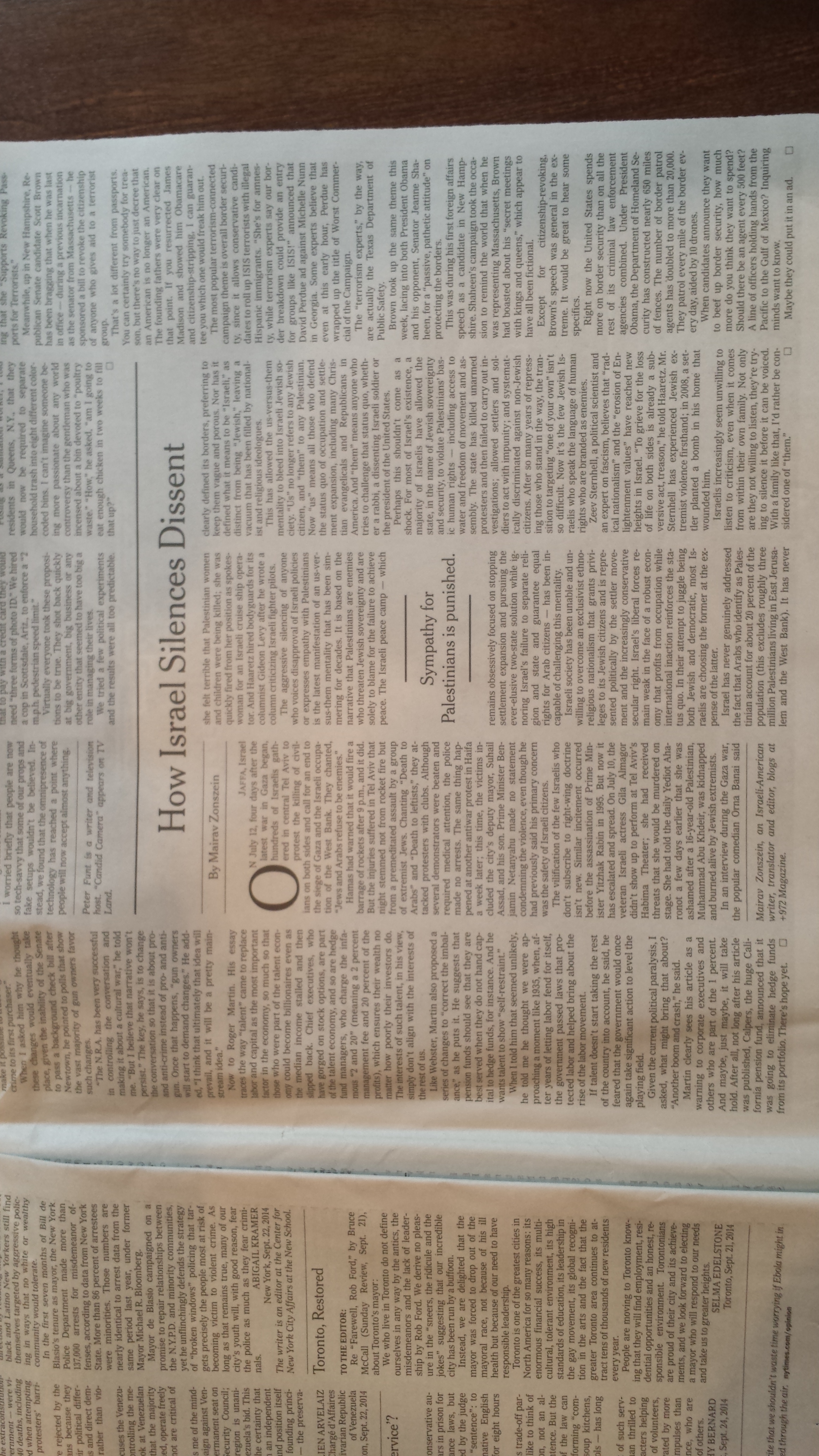DOES ISRAEL HAVE FREEDOM OF THE PRESS? NEW YORK TIMES: "NONSENSE"
by First One Through
BackgroundBefore, during and after Israel's entry into Gaza in July 2014 to stop missile barrages from Gaza into Israel, reports started coming out that Hamas threatened to restrict, restrain and do bodily harm to journalists that showed pictures of Hamas firing missiles. They could take all the photos they liked of dead Arabs — especially women and children — as long as they attributed the deaths to the IDF and not to Hamas using civilians as human shields; they could interview family members of dead terrorists, who, satiated with celebrating Hamas' kill score, were now ready to grieve publicly over their dead heroes; they could walk through the rubble with Arabs, former home owners. as they identified beloved articles that had miraculously survived Israeli bombing undamaged. But there was to be no link between Israeli action and anything Hamas had done to deserve such attacks. [See, e.g., here, and here and an excellent analysis by Clifford May here.] As May noted, "Also scarce in the major media: stories about Hamas deploying civilians as human shields, storing missiles in mosques and United Nations schools, setting up command posts in hospitals, using ambulances to ferry terrorists to battle, and employing children to dig tunnels — with at least 160 killed in the process. How many stories have you seen about humanitarian supplies flowing from Israel to Gaza in the midst of this bloody conflict and the hundreds of Gazans treated in Israeli hospitals?" — Editor, Think-Israel
On May 1, 2014, Freedom House, a leading advocacy group on democracy and political freedom, released its annual report on freedom of the press around the world. "Global press freedom has fallen to its lowest level in over a decade" according to their report, led by declines in: Egypt; Libya; Jordan; Syria and Turkey. A notable exception was Israel, which became the only country in the entire MENA (Middle East and North Africa) to be ranked as having a free press.
Select 2013 country rankings (bold are MENA countries):
Israel (62)
Italy (64)
Chile (64)
South Korea (68)
South Africa (69)
India (78)
Philippines (87)
Brazil (90)
Argentina (106)
Lebanon (112)
Tunisia (112)
Kuwait (127)
Turkey (134)
Libya (134)
Morocco (147)
Qatar (152)
Jordan (155)
Egypt (155)
Iraq (157)
Oman (161)
Yemen (167)
UAE (167)
Ethiopia (176)
West Bank, Gaza (179)
Somalia (179)
Saudi Arabia (181)
Syria (189)
Iran (190)
The New York Times declined to cover the story in May. However, on September 26, 2014 it ran an op-ed called "How Israel Silences Dissent". The editorial said that the Israeli government punishes journalists that show sympathy for the Palestinians. There was no mention of the Freedom House ranking at that time either.
There was also no discussion of the Palestinians' intimidation of the press. While the NYT was printing its anti-Israel editorial, the Foreign Press Association was reporting on the intense discrimination they endured in covering Operation Protective Edge: "The FPA protests in the strongest terms the blatant, incessant, forceful and unorthodox methods employed by the Hamas authorities and their representatives against visiting international journalists in Gaza." Even the extreme Israeli left-wing paper Haaretz reported that "some reporters received death threats. Sometimes, cameras were smashed. Reporters were prevented from filming anti-Hamas demonstrations where more than 20 Palestinians were shot dead by Hamas gunmen."

The New York Times did not report on any of this. The only time the NYT opted to quote the FPA during the 2014 Palestinian war against Israel was early in the conflict on July 23 when the FPA complained about Israeli intimidation.
While ignoring the Hamas harassment, the Times was not completely silent. Jodi Rudoren, the New York Times Middle East Bureau chief decided to make her position clear — on Twitter. Roduren proclaimed: "Every reporter I've met who was in Gaza during war says this Israeli/now FPA narrative of Hamas harassment is nonsense."
Is the FPA only worth quoting when they complain about Israel? Is an opinion piece about possible Israeli intimidation the only op-ed that is worth printing while remaining silent about Hamas death threats? Is the uniqueness of Israel's record of freedom of the press too hard for the New York Times to believe and therefore to report?
"Nonsense" seems to be the New York Times sense of balanced and accurate coverage.
"FirstOneThrough is dedicated to educating people in an
entertaining manner so they speak up and take action. The action
can be as simple as forwarding articles or videos to people, or
using the information to fight on behalf of a cause. The topics
cover Israel, the United States, Judaism and science." This
article was published October 11, 2014 and is archived at
http://www.firstonethrough.wordpress.com/tag/freedom-house/
October 2014 archives.